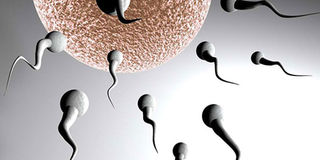Doctors fight for patients with infertility issues

Human sperm cells. Treating infertility is a costly venture. PHOTO | FILE | NATION MEDIA GROUP
What you need to know:
- According to the doctors, sexually transmitted infections and pesticides consumed in food are the main causes of infertility in Kenya.
- Among women, the chances of those above 35 getting pregnant reduce due to the decrease in the number and quality of their eggs.
- The doctors also want laws supporting assisted reproductive technology like In Vitro Fertilisation (IVF) drafted and passed.
About nine million Kenyans have infertility-related complications, with a majority unable to meet the high cost of treatment, a gynaecologists and obstetricians group says.
At the close of the 43rd Kenya Obstetrical and Gynaecological Society annual conference in Nairobi, the union said that infertility had reached epidemic proportions, and yet it is yet to be acknowledged as a medical condition.
Society President Benjamin Odongo and Secretary-General Kireki Omanwa said Kenyans’ changing lifestyles had exposed 15 to 20 percent of the population to primary or secondary infertility problems.
“A study at Kenyatta National Hospital showed that three quarters of gynaecological consultations are due to infertility,” Dr Omanwa said at the summit, which attracted more than 400 obstetricians, gynaecologists and allied stakeholders drawn from Kenya and abroad.
COST
Dr Odongo said the cost of medication, being between Sh400,000 and Sh600,000, coupled with lack of medical insurance packages, infrastructure, few experts and no excellence centres, have led to more suffering.
“The society urges health insurance companies and agencies, including the National Hospital Insurance Fund, to incorporate infertility management as an essence package.
"The Constitution guarantees physical, mental and social health for all. Infertility affects the mental and social aspects,” Dr Odongo said.
The conference was told that whereas civil servants have covers for infertility, a majority of the other Kenyans affected are at the bottom of the economic pyramid, surviving on less than Sh100 a day.
According to the doctors, sexually transmitted infections and pesticides consumed in food are the main causes of infertility in Kenya.
AGE
They said people’s sexual lives have become liberal “since having multiple partners is no longer frowned upon”.
For men, infertility comes in form of blocked tubes, undescended testicles, varicocele, swollen veins around the scrotum, complications arising from surgeries and other factors.
This is even with those who generally lead healthy lifestyles and neither drink nor smoke.
“Unlike the 1970s when an average man would have a sperm count of around 300 million, it is rare these days to find one with 200 million,” Dr Omanwa said.
He added that patients do not provide tangible information about the possible reasons for infertility.
Among women, age is the biggest contributor of childlessness.
FIBROIDS
The chances of those above 35 getting pregnant reduce due to the decrease in the number and quality of their eggs.
“Some women’s tubes are blocked. This is due to STIs like chlamydia. The chance of a black woman having fibroids within her reproductive cycle is 40 to 50 percent. The other cause of infertility is endometriosis,” Dr Omanwa added.
The doctors also want laws supporting assisted reproductive technology like In Vitro Fertilisation (IVF) drafted and passed.
They say it will regulate operations in reproductive health “which have been taken over by foreigners who operate unchecked and take advantage of Kenyans”.
“IVF is more expensive in Kenya than in the US because our country does not have enough specialists. The medication and consumables are costly because of the import charges,” Dr Omanwa said.
“Pharmaceutical firms push import taxes to the consumer. If the government does away with the taxes, IVF will be affordable.”
FAMILY PLANNING
He added that there is need to set up centres of excellence for treatment.
The union wants family planning services improved.
According to the doctors, family planning plays a big role in the health and survival of women and their children, cancer treatment and the fight against female genital mutilation.





